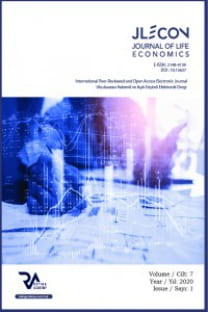İçsel ve dışsal Covid-19 korkusunun uzaktan calışmanın faydası üzerindeki etkileri: Türk finans sektöründen bir örnek
2020 yılı başında salgına neden olan Covid-19 virüsü tüm dünyada korkuya neden olmuş, ekonomik ve sosyal yaşam üzerinde derin izler bırakmıştır. Bu çalışmada, finans sektöründe çalışanların Covid-19 korku düzeyi ile uzaktan çalışmadan algıladıkları fayda düzeyi arasındaki bağlantı incelenmekte ve çalışanlara ilişkin demografik faktörlerin algılanan fayda üzerinde farklılık yaratıp yaratmadığı araştırılmaktadır. 458 finans sektör çalışanı ile yapılan çevrim içi anket uygulamasından elde edilen veriler CHAID yöntemi ile analiz edilmiştir. Bulgular, finans sektör çalışanlarının Covid-19 korku düzeyinin yüksek olduğunu, artan Covid-19 korku ile birlikte uzaktan çalışmanın algılanan faydasının arttığına işaret etmektedir. Ancak, uzaktan çalışmanın faydasını yüksek bulanların oranının, faydayı düşük bulanlara göre gözle görülür biçimde belirgin olmadığı anlaşılmaktadır. Uzaktan çalışmanın algılanan faydasının demografik özelliklere göre farklılaşmakta olduğu görülmüş ve uzaktan çalışmanın kalıcı olması konusunda yeterli destek oluşmadığı anlaşılmıştır. Bulgular, finans sektörü ile politika yapıcılar ve akademisyenler için veri oluşturacak sonuçlar içermektedir.
Anahtar Kelimeler:
Covid-19 korkusu, Uzaktan Çalışma, Finans Sektörü Çalışanları, CHAID Analizi
Effects of internal and external covid-19 fear on the benefit of teleworking: an example from the Turkish finance sector
The Covid-19 virus, which caused an epidemic at the beginning of 2020, caused fear all over the world and left deep impacts on economic and social life. In this study, the relationship between the level of Covid-19 fear and the level of benefit, employees perceive from tele working is examined and it is investigated whether the demographic factors of the employees make a difference on the perceived benefit. The data obtained from the online survey conducted with 458 finance sector employees were analyzed by the CHAID method. The findings indicate that the level of Covid-19 fear of financial sector employees is high, and the perceived benefit of teleworking has increased the Covid-19 fear. However, it is understood that the rate of those who think the benefit of teleworking is high, is not visibly significant compared to those who think the benefits of teleworking is low. It has been observed that the perceived benefit of teleworking differs according to demographic characteristics, and it has been understood that there is not enough support for the permanence of tele-working. The findings of the paper have some implications the financial sector, policy makers and academics.
Keywords:
Fear of Covid-19, Tele-Working, Finance Industry Workers, CHAID Analysis,
___
- AKŞAHAN, R.& KESKİN, İ. (2015) Sığırlarda Besi Sonu Canlı Ağırlığını Etkileyen Bazı Vücut Ölçülerinin Regresyon Ağacı Yöntemi ile Belirlenmesi. Selçuk Tarım Bilimleri Dergisi. 2(1):53-59
- BİLGİNOĞLU, E. (2021). Covid-19 Pandemisi Sırasında Uzaktan Çalışmanın Artan Önemi: Bilinen Yanlışlar ve Doğruları. Çalışma ve Toplum, 69(2). 1099-1146.
- BOZKURT, V. (2020). Working During A Pandemic: Economic Concerns, Digitalization, And Productivity. Demirtaş, D., Bozkurt, V., & Yorgun, S. (eDİTÖRLER), The COVID-19 Pandemic and Its Economic, Social, and Political Impacts içinde, 87-106.
- DOĞAN, M. M. & DÜZEL, B. (2020). Covid-19 Özelinde Korku-Kaygı Düzeyleri. Electronic Turkish Studies, 15(4). 739-752. https://dx.doi.org/10.7827/TurkishStudies. 44678.
- LADİKLİ, N., BAHADIR, E., YUMUŞAK, F. N., AKKUZU, H., KARAMAN, G., & TÜRKKAN, Z. (2020). Kovid-19 Korkusu Ölçeği’nin Türkçe Güvenirlik ve Geçerlik Çalışması. International Journal of SocialScience, 3(2), 71-80.
- NGUYEN, M. H. (2021). Factors Influencing Home-Based Telework in Hanoi (Vietnam) During and After The COVID-19 Era. Transportation, 1-32.
- ÖZEN, E., GRİMA, S., & HAMARAT, B. (2021). Teleworking and Emotional Experience and Wellbeing: The Case in the Turkish Financial Services Industry During COVID-19. Scientific Annals of Economics and Business. 68(3), 345-360. DOI: 10.47743/saeb-2021-0016.
- SATICI, B., GOCET-TEKİN, E., DENİZ, M. E., &SATİCİ, S. A. (2020). Adaptation of the Fear of COVID-19 Scale: Its association with psychological distress and life satisfaction in Turkey. International journal of mental health and addiction, 1-9.
- SÜMBÜLOĞLU, K. & AKDAĞ B. (2007). Regresyon Yöntemleri ve Korelasyon Analizi. Hatipoğlu Yayın evi, 73-80, Ankara.
- Yayın Aralığı: Yılda 4 Sayı
- Başlangıç: 2014
- Yayıncı: Rating Academy
Sayıdaki Diğer Makaleler
Çalışma yaşamında yenilikler: Pandemi ile dijitalleşme deneyimi
Tüketicilerin sinik davranışlarının netnografya ile tespiti
Energy consumption, economic development and environmental degradation nexus for Nigeria
David USHIE, Esther Ranmilowo ADERINTO
Akademide zaman yönetimi tutumlarında cinsiyetin faktörü: Bir vakıf üniversitesinde araştırma
Analysis of the relationship between innovation, CO2 emission and renewable energy in Turkey
Selim İNANÇLI, Mustafa TORUSDAĞ
Elif Alar ERKAL, Atılhan NAKTİYOK
Kamu harcamaları ile vergi gelirleri ilişkisi: Pandemi öncesi ve sonrası için bir değerlendirme
